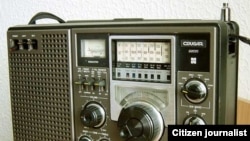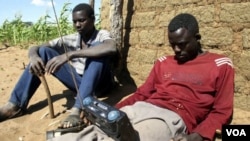WASHINGTON DC —
As Zanu PF got a fresh five year mandate to extend its 33 years in power, following recent elections which the party won by an overwhelming majority, there are fears that President Robert Mugabe’s government may not implement a wide range of media reforms initiated by the previous unity government.
Some critics argue that a constitutional clause guaranteeing media reform will only remain on paper as Zanu PF has failed since independence in 1980 to open up the media landscape, especially the airwaves – a critical element in the country’s democratization process.
Zimbabwe’s new constitution guarantees media freedom though there are laws such as the Access to Information and Protection of Privacy Act and the Public Order and Security Act which critics say curtail the free-flow of information in the country.
And with a new Zanu PF government in power, media advocates, opposition parties and some stakeholders believe that President Mugabe’s party now with a two thirds parliamentary majority can scrap constitutional provisions guaranteeing media freedom.
For political analyst, Nkululeko Sibanda of Huddersfield University in London, the future of the media now looks bleak in Zimbabwe following Zanu PF’s re-election.
Mr. Sibanda says nasty conflicts within Zanu PF over the succession of its 89 year old leader may force the government to control the media for its own benefit.
“It’s bleaker than it has been before given the ideological base of Zanu PF where propaganda in the media is central to hiding its evil deeds be it arrests, be it political, corruption and so forth,” he said.
Sibanda said there is a possibility of constitutional changes especially if the Zanu PF succession issue turns nasty.
“In order to protect the incoming person and to protect (President Robert) Mugabe, we are likely to see quite a few amendments including those mostly relating to the media.”
His views are echoed by Thabani Moyo, Advocacy Officer of the Zimbabwe chapter of the Media Institute of Southern Africa, who says media reforms initiated by the MDC formations and Zanu PF while in power, had given the country a ray of hope about the opening up the media landscape for independent entities.
“”Unfortunately the party that is coming into power can actually overturn the gains of media freedom that are explicit in the constitution and the need for access to information and the need to protect journalistic sources and artistic creativity. We are heading for challenging times,” he said.
And for Mathew Takaona, a member of the Zimbabwe Media Commission, there is no reason to worry about the Zanu PF government even if it fails to institute immediate media reforms.
“Now the elections are over and I am sure there is a little bit of freedom to do some of the things that people were afraid to do before the elections. So, I am sure some people may have enough courage to say now it’s the time to give the people more freedom of expression and freedom of the media,” said Mr. Takaona.
Raphael Khumalo, Chief Executive of Alpha Media, which owns four independent newspapers, agrees, saying the Zanu PF government won’t repeal constitutional provisions guaranteeing media freedom.
Khumalo says media freedom is largely determined in Zimbabwe by ministers of information.
Although a remarkable number of independent newspapers were registered under the unity government, little was done to open the airwaves to private entities.
But John Masuku of the Voice of the People radio station, which applied for a licence and was denied by the unity government, has not lost hope.
At least for now, he may be right as Psychology Maziwisa, Zanu PF’s deputy information officer, dismisses claims that the former liberation party will repeal a constitutional provisions guaranteeing media freedom.
Zimbabwe has one national broadcaster and at least two so-called independent radio stations which are run by the state-controlled Zimbabwe Newspapers Group and Zanu PF parliamentarian Supa Mandiwanzira.
For now, indications are that Shortwave Radio Africa, the Voice of America’s Studio 7 and 1st Television will continue to broadcast from abroad for the next five years.
Some critics argue that a constitutional clause guaranteeing media reform will only remain on paper as Zanu PF has failed since independence in 1980 to open up the media landscape, especially the airwaves – a critical element in the country’s democratization process.
Zimbabwe’s new constitution guarantees media freedom though there are laws such as the Access to Information and Protection of Privacy Act and the Public Order and Security Act which critics say curtail the free-flow of information in the country.
And with a new Zanu PF government in power, media advocates, opposition parties and some stakeholders believe that President Mugabe’s party now with a two thirds parliamentary majority can scrap constitutional provisions guaranteeing media freedom.
For political analyst, Nkululeko Sibanda of Huddersfield University in London, the future of the media now looks bleak in Zimbabwe following Zanu PF’s re-election.
Mr. Sibanda says nasty conflicts within Zanu PF over the succession of its 89 year old leader may force the government to control the media for its own benefit.
“It’s bleaker than it has been before given the ideological base of Zanu PF where propaganda in the media is central to hiding its evil deeds be it arrests, be it political, corruption and so forth,” he said.
Sibanda said there is a possibility of constitutional changes especially if the Zanu PF succession issue turns nasty.
“In order to protect the incoming person and to protect (President Robert) Mugabe, we are likely to see quite a few amendments including those mostly relating to the media.”
His views are echoed by Thabani Moyo, Advocacy Officer of the Zimbabwe chapter of the Media Institute of Southern Africa, who says media reforms initiated by the MDC formations and Zanu PF while in power, had given the country a ray of hope about the opening up the media landscape for independent entities.
“”Unfortunately the party that is coming into power can actually overturn the gains of media freedom that are explicit in the constitution and the need for access to information and the need to protect journalistic sources and artistic creativity. We are heading for challenging times,” he said.
And for Mathew Takaona, a member of the Zimbabwe Media Commission, there is no reason to worry about the Zanu PF government even if it fails to institute immediate media reforms.
“Now the elections are over and I am sure there is a little bit of freedom to do some of the things that people were afraid to do before the elections. So, I am sure some people may have enough courage to say now it’s the time to give the people more freedom of expression and freedom of the media,” said Mr. Takaona.
Raphael Khumalo, Chief Executive of Alpha Media, which owns four independent newspapers, agrees, saying the Zanu PF government won’t repeal constitutional provisions guaranteeing media freedom.
Khumalo says media freedom is largely determined in Zimbabwe by ministers of information.
Although a remarkable number of independent newspapers were registered under the unity government, little was done to open the airwaves to private entities.
But John Masuku of the Voice of the People radio station, which applied for a licence and was denied by the unity government, has not lost hope.
At least for now, he may be right as Psychology Maziwisa, Zanu PF’s deputy information officer, dismisses claims that the former liberation party will repeal a constitutional provisions guaranteeing media freedom.
Zimbabwe has one national broadcaster and at least two so-called independent radio stations which are run by the state-controlled Zimbabwe Newspapers Group and Zanu PF parliamentarian Supa Mandiwanzira.
For now, indications are that Shortwave Radio Africa, the Voice of America’s Studio 7 and 1st Television will continue to broadcast from abroad for the next five years.






